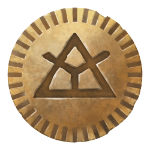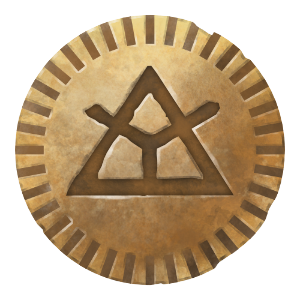Ludovic
A relative newcomer to Glorantha, Ludovic has been playing role-playing games for more than 30 years, most of it as the Game Master. By some weird European circumstance, he managed to completely pass D&D, and instead dived into The Dark Eye, Rolemaster, Cyberpunk, Vampire and, eventually, Call of Cthulhu (which he has played ever since in one form or another). When the Guide to Glorantha got released, the wonderful maps were too much to resist, and he started his journey into Dragon Pass.
You can find Ludovic on the internet fairly easily: his name is unusual enough, and he has been using the same online pseudonym since the late 90s.
Joerg
Born in Kiel in 1965, lived there for most of my life.
Left university with a diploma in chemistry and having founded Kiel university’s rpg association AKF (ArbeitsKreis Fantasy, which translates something like “study group fantasy” or “work circle fantasy”). Spent a little over a year working in Northern Norway right after getting that diploma, and returned shortly three years later.
I started world-building (sitting down writing up characters and countries and drawing maps) at about age 12 or so, started reading fantasy at age 14, started reading English language fantasy at age 16. First heard about role-playing games at around age 15, but never got my hands on any before age 20 after probably 2 years of playing solo adventure books. And I encountered a German book about a couple of German language rpgs (some translations, two original German ones), plus AD&D and RuneQuest.
First rpg experience was as GM with rules improvised from “Warlock of Firetop Mountain” and “The Citadel of Chaos” (the latter for its magic rules) and two completely improvised adventures – one dungeon, one overland journey.
Enjoyed that experience, then bought the basic boxes of Das Schwarze Auge (The Dark Eye – second print run, I think) and the red D&D translated to German.
Played The Dark Eye for a short while, then acquired Midgard (the first German rpg, still first edition) and found out about an rpg convention in my home town. Got into a game of the then brand new second edition of Midgard, enjoyed it vastly over what I had in earlier published games, and created a gaming group of fellow chemistry students.
Visited another of the local conventions (run by a couple of high school students who also produced a fanzine which was semi-professional for the standards of its time). That convention turned out to be the last one by that group, and when nobody else went about organizing another convention in Kiel, I started looking into doing so myself.
In order to do so, I founded the university rpg association with the members of my Midgard game, we got a room for free, and held our first convention (Unicon), optimistically planned for 120 participants, with a turn-out of 180 participants. 28th of January 1988.
Two years later and with four conventions under our belt, I finally managed to start a RuneQuest game, though (once again) on a world of my own rather than the Glorantha setting most people associated with that game. That game setting was based on the RQ3 Vikings supplement and my own fantasy map, which grew into a world book of more than a hundred print pages. A (very short, 8 or 12 pages) description of that world became an issue of the just-for-fun fanzine of our association.
Having translated most of the RQ3 rules into German (to get a better grasp on them), I met the official translator of the game on a convention in Hamburg and learned about the upcoming release in German. Through this contact, I managed to visit the first German RQ convention in Cologne (as one of two conventions I visited across Germany on that long weekend), and while I missed the founding session of the German RuneQuest Society, I joined shortly after before leaving for my Northern Norwegian stint.
After a year mostly incommunicado, getting a whole lot of stuff written, I returned to Germany, picked up my RQ game with vastly expanded background notes, and a fledgeling project collecting the Glorantha information available to me at that time.
Shortly afterwards I received my copy of Free INT issue 1, made quite amateurishly, and loudmouthed that I could do better. That got me the job as editor, layouter and increasingly also author of the magazine, until I created about 80% of the Vikings issue (#7), at which time I passed on the editor’s job.
In 1993 I got my private internet access (email and newsgroups, at that time), and that coincided nicely with the introduction of the RuneQuest Daily the same year. By the end of that year I was a regular contributor to the Daily.
When King of Sartar was published, I studied the book apart (literally – the glued softcover became a stack of loose pages) and cross-referenced it with the Glorantha info available to me.
After that experience as editor, I was elected as one of the chairmen of the RQ society, which organized the RQ conventions in Germany, continued to publish Free INT, and after a while also went into the English language market with Tradetalk, starting with some translations of our original German material. The German RuneQuest Society also created two fan-written publications produced by the German licensee of RQ3, became the European distributor of the Fanzine RuneQuest Adventures.
I GMed my first RuneQuest in Glorantha using the playtest rules for RQ-Adventures in Glorantha that were prepared for Avalon Hill before being vetoed in their current form by Greg Stafford.
In 1994 I visited Convulsion convention in Leicester, played my first massive Freeform game (How the West Was One), and met a great number of luminaries, many of whom I had encountered on the Daily before.
In 1995 and 1996 I aided in the writing and running of the first German bilingual Glorantha freeforms at our conventions.
I discovered the Holy Country for my Gloranthan playground, created a website that expanded slightly on the information available on the region spiced up with the background from my own campaign. Some of that material also ended up in the Tradetalk magazine.
My cross-referencing of information grew into my Glorantha index attempting to make all the Glorantha information available to me accessible and interlinked, and explaining the index entries.
While I had no practical experiences with data bases, I lucked into tagging that index in a way that could be parsed as input to a database via a PERL script (provided by Alex Ferguson), and so my index grew to considerable size as an MS Access database.
Sharing that index with Greg Stafford and my writings on the Holy Country landed me as one of about a dozen of fans recruited as experts on the setting when the new Hero Wars rpg was rushed towards publication.
When my mother fell ill with a fatal cancer, I retreated from most rpg or Glorantha activities for that year.
Afterwards, my index and the digest participation alongside the German conventions became my main rpg and Glorantha activity. I managed to contribute somewhat to a number of the Heroquest 1 publications, and my index was made web accessible by Charles Corrigan, creating about 20,000 new webpages of Glorantha information. It remained online for a couple of years, with me providing active content maintenance and expansion, until it was lost to a change of providers for glorantha.com.
Typing in, interlinking and tagging all that published data left me with a fairly good knowledge of the setting. It also served as a research tool for a couple of publications by other authors (and earned me the contributor’s credit for the Dragon Pass gazetteer by Ian Cooper).
I also became involved in a number of online co-operations that resulted in some fine fan-created material, like the Whitewall wiki and mailing list.
I’m still a high profile contributor to the RuneQuest, HeroQuest and Glorantha forums on basicroleplaying.org.
This podcast is my newest adventure in my explorations of Glorantha.

